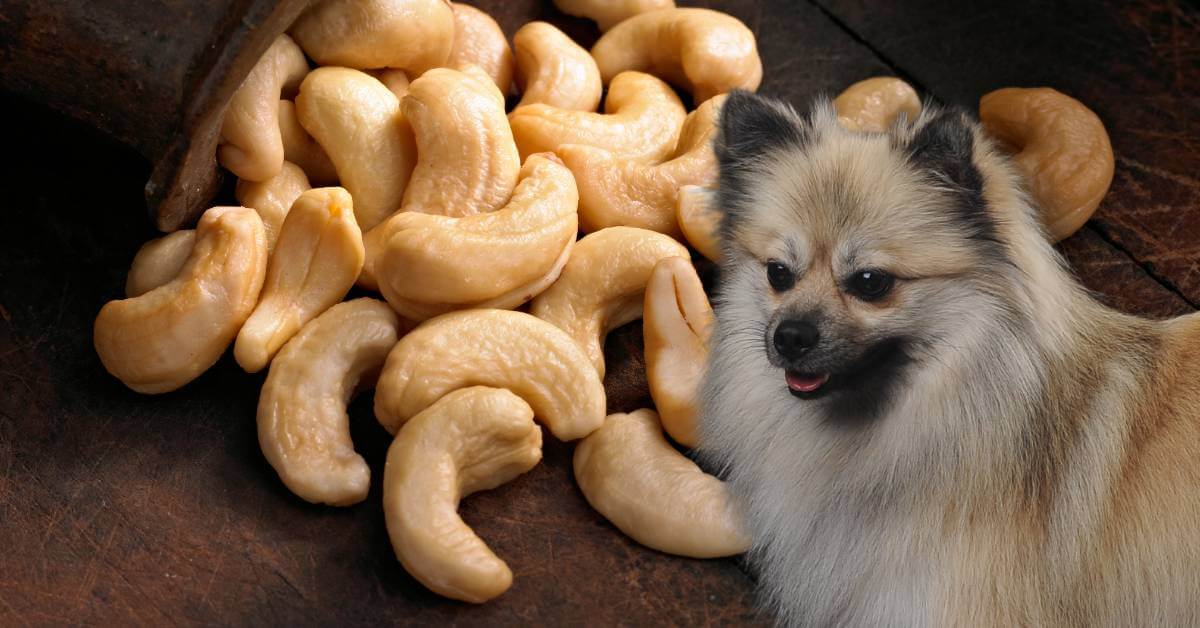Can Dogs Eat Cashews?
Cashews are fine for dogs in small amounts. They are rich in healthy fats but high in calories, so dogs should only eat a few pieces at a time. Ideally, you wouldn’t give your dog cashews all the time, but if they happen to steal some, don’t worry!

Now, the type of cashews really matters. In my house, we adore salted and baked cashews, and my dog also wants to steal them, but I don’t give him any. Too much sodium is really bad for dogs, especially in combination with fats, so be careful when sharing nuts with them. Salted cashews are a bad idea, but plain ones, similar to plain unsalted peanuts, are fine for dogs.
Can dogs eat raw cashews?
This really depends on what you consider “raw” cashews. What we usually think of as raw cashews are not raw at all. We just mean that they aren’t fried, coated with spices, or baked with salt, or something like that.
Actual raw cashews are not safe to eat, not for dogs and not for people. Before they get to us, cashews have to be cooked to remove the toxins, and then they are safe to eat.
So, dogs can eat plain cashews, just like people can, but they should only have them in moderation. Cashews are a good source of fat, protein, and some vitamins and minerals, like magnesium and zinc.
But cashews are also high in calories, which means they should be an occasional snack for both us and our dogs. Similar to peanuts, granola, and other nuts, they are healthy but only in moderation.
While fats and proteins are the main sources of energy for dogs, they get most of these nutrients from their kibble, so giving them additional fatty foods isn’t the best idea. It can lead to unnecessary weight gain and digestive issues.
I know most dogs enjoy crunchy treats, so just a couple of cashews are fine, but more than that will be too much for them and add a lot of extra calories.
What about salted or honey-roasted cashews?
Salted, fried, or honey-roasted cashews aren’t toxic to dogs. Even if your cashews have something like garlic or onion powder (which we know aren’t good for dogs), the amount in those snacks is usually so small that it won’t hurt them.
But here’s the thing—if your dog eats too many salty or spiced snacks, it can irritate their stomach and mess with their digestion. Too much salt can lead to dehydration or cause issues over time, and the sugar in honey-roasted cashews isn’t great either.
So while your dog can eat honey-roasted cashews without any big problems, it’s always better to stick with healthier snacks that are good for their nutrition in the long run.
What are the risks of feeding your dog cashews?
The most obvious and biggest risks with giving your dog cashews are the calories and fat! Cashews are rich in healthy fats, and that’s why they are a great energy source for us. But does your dog need that kind of energy bomb? Not really. Giving them too many nuts like cashews can lead to weight gain, and that’s never a good thing.
Then there’s the issue with snacking on human snacks. Like peanuts, sunflower seeds, pumpkin seeds, or almonds, cashews can be a choking hazard, especially if your dog isn’t used to chewing them properly. They could get stuck in their throat, hurt their gums, or worse, cause an intestinal blockage.
Plus, most cashews we buy are loaded with salt and spices, which can upset your dog’s stomach. Dogs really shouldn’t eat too much sodium, as it can lead to dehydration and even long-term health problems.
While nuts and seeds are healthy for us and give us energy, they aren’t really meant for dogs. I mentioned this when I wrote about whether dogs can eat granola—too much of these foods will make dogs fat, and giving your dog too many nuts and seeds can cause a nutritional imbalance. It’s best to give them just a couple of nuts as a treat, but not get them hooked.
What does science say about dogs eating cashews?
I found a great study about plant-based ingredients in dogs’ diets that include fruits, vegetables, legumes, and nuts! And here’s what it specifically says about dogs eating cashews!
In conclusion, cashews aren’t harmful to dogs in small amounts, but they’re not a necessary addition to their diet. Cashews are high in calories and fats, which can lead to weight gain and digestive issues if you overdo it.
Everything you read about the health benefits of cashews for dogs, is not maybe that accurate, as cashews are absolutely not dog food. A few cashews here and there are fine, but it’s best to keep their main source of nutrition coming from dog food. Keep those salty and spiced varieties away, too—they’ll just irritate your dog’s stomach. As always, moderation is key!
Love, life, and fur forever!
FAQs
Can dogs eat cashews safely?
Yes, dogs can eat cashews safely, but it’s best to give them unsalted cashews and only in moderation. Cashews are high in fat and calories, so it’s best to give them just a few pieces as an occasional treat.
Can dogs eat cashews with sea salt?
It’s better not to give your dog cashews with sea salt. If they grab them by accident, don’t worry, a small amount won’t harm them. But keep in mind that too much salt can upset their stomach and lead to dehydration.